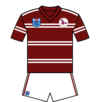
The Brisbane Broncos Rugby League Football Club Ltd., commonly referred to as the Broncos, is an Australian professional rugby league football club based in Brisbane, Queensland. Founded in April 1987, the Broncos currently compete in the National Rugby League (NRL). The club has won six premierships, including two New South Wales Rugby League premierships, a Super League premiership and three NRL premierships. The Broncos have won two World Club Challenges, and four minor premierships in multiple competitions. Prior to 2015, Brisbane had never been defeated in a grand final, and since 1991, the club has failed to qualify for the finals five times. The club is one of the most successful clubs in the National Rugby League since it began in 1998, winning three premierships. The club is one of the most successful clubs in the history of rugby league, having won 59.9% of games played since its induction in 1988, second only to Melbourne Storm with 67.3%.
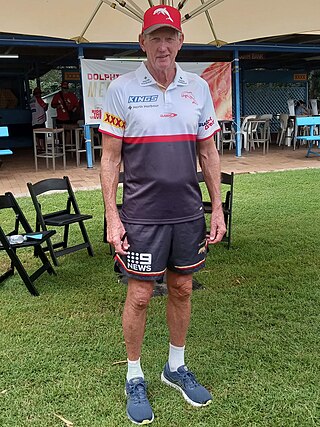
Wayne James Bennett, also known by the nickname "Benny", is an Australian professional rugby league football coach and former player. He is currently the head coach of the Dolphins in the National Rugby League (NRL), and has previously coached the South Sydney Rabbitohs, the Brisbane Broncos, the Newcastle Knights, the St George Illawarra Dragons, the Canberra Raiders, the Queensland Maroons State of Origin team, the NRL All Stars and the Australian Kangaroos national team as well as the England and Great Britain national teams.
The St. George Dragons was an Australian rugby league football club from the St George District in Sydney, New South Wales that played in the top level New South Wales competition and Australian Rugby League competitions from the 1921 until the 1997 ARL season, as well as the unified 1998 National Rugby League season. On 23 September 1998, the club formed a joint venture with the Illawarra Steelers, creating the St. George Illawarra Dragons team which competed in the 1999 NRL season and continues to compete in the league today. As a stand-alone club, it fields teams in the NSWRL underage men's and women's competitions, Harold Matthews Cup, S.G. Ball, and Tarsha Gale Cup.
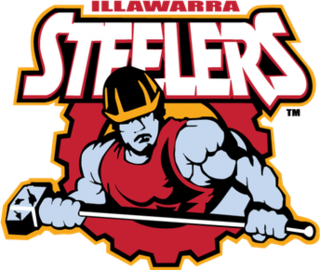
The Illawarra Steelers are an Australian rugby league football club based in the city of Wollongong, New South Wales. The club competed in Australia's top-level rugby league competition from 1982 until 1998. On 13 December 1980, they were the first non-Sydney based team to be admitted into the New South Wales Rugby League premiership, with the Canberra Raiders being admitted later ensuring an even number of teams in the competition for the start of their first season, 1982. Over their seventeen years in the top grade, the club received three wooden spoons, made the play-offs twice and had a total of three of its players selected to play for the Australia national rugby league team.

Allan Jeffrey "Alfie" Langer AM is an Australian former multi-award-winning rugby league footballer who played in the 1980s, 1990s and 2000s and worked as an assistant coach for the Australian national team, the Queensland Maroons and the Brisbane Broncos.
Kevin David Walters is an Australian professional rugby league football coach and former player, who has been the head coach of the Brisbane Broncos in the National Rugby League (NRL) since 2021.
Steven Renouf is an Australian former professional rugby league footballer who played in the 1980s, 1990s and 2000s. Nicknamed 'the Pearl', he was known as one of the sport's greatest centres. Renouf set numerous records for the Brisbane Broncos club. After spending eleven years with Brisbane, which yielded four premierships, he left Australia to play for English club Wigan Warriors, where he spent two seasons before retiring. He was named in Australia's Indigenous team of the century (1908–2007).
William Carne is a former Australian rugby footballer who played rugby league for the Brisbane Broncos from 1990 to 1996, as well as representing both Queensland and Australia and rugby union for the Queensland Reds. An attacking player with dangerous speed, he played at wing and fullback.
The 1997 Super League season was a breakaway professional rugby league football competition in Australia and the only one to be run by the News Limited-controlled Super League organisation. Eight teams which had broken away from the existing Australian Rugby League, in addition to the newly created Adelaide Rams and Hunter Mariners, competed over eighteen weekly rounds of the regular season. The top five teams then played a series of knock-out finals which culminated in a September grand final played in Brisbane between the Brisbane Broncos and Cronulla.
The 1992 Brisbane Broncos season was the fifth in the club's history and they competed in the NSWRL's 1992 Winfield Cup premiership. Under new captain Allan Langer they finished the regular season 1st to claim their first minor premiership before going on to play in their first grand final and win, transporting the Winfield Cup trophy north of the New South Wales border for the first time. The Broncos then also became the first Australian club to win the World Club Challenge.
The 1993 Brisbane Broncos season was the sixth in the club's history. Coached by Wayne Bennett and captained by Allan Langer, they competed in the NSWRL's 1993 Winfield Cup premiership, finishing the regular season 5th before going on to play in a re-match of the previous year's grand final against the St George Dragons and again win, claiming consecutive premierships. In doing so they also became the first team in history to win the premiership from fifth position.
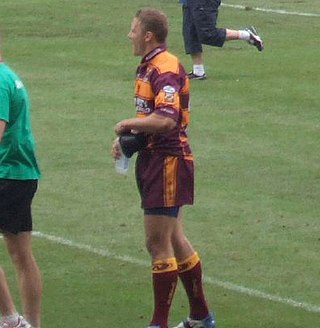
Michael De Vere is an Australian former professional rugby league footballer who played in the 1990s and 2000s. He represented Australia in four tests and New South Wales in five State of Origin matches. A goal-kicking outside back who could play centre, wing or fullback and also a skilful goal-kicker who ended his career having kicked at 76.62%, De Vere played club football for the Brisbane Broncos in the NRL, with whom he won the 1997, 1998 and 2000 premierships. He later played with English club the Huddersfield Giants in the Super League, reaching the 2006 Challenge Cup final. In 2009, he instigated a comeback with the Brisbane Broncos, which only lasted one game before he retired.
The history of the Brisbane Broncos Rugby League Football Club stretches back from their inception in the mid-1980s to the present day. They were introduced to the NSWRL's Winfield Cup premiership in 1988, taking the competition by storm in winning their first six games. The Broncos participated in 18 consecutive finals series from 1992–2009, winning premierships six times, including the 1992 and 1993 NSWRL premierships, the Superleague premiership in 1997 and then the 1998, 2000 and 2006 National Rugby League premierships.
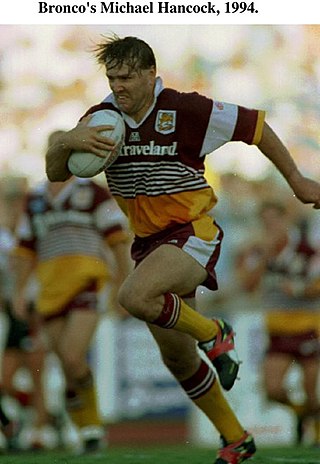
Michael John "Mick" Hancock is an Australian former rugby league footballer who played in the 1980s, 1990s and 2000s. An Australian international and Queensland State of Origin representative wing, he played in the Brisbane Broncos' first five Grand Final victories in 1992, 1993, 1997 Super League, 1998 and 2000. At the time of his retirement from football in Australia in 2000 he held the Broncos' club records for most career appearances. He played out the rest of his career in England with the Salford City Reds and retired in 2002.
Andrew Gee is an Australian rugby league administrator and former football operations manager at the Brisbane Broncos of the NRL. Also a former player with the club, he was a Queensland State of Origin representative prop, and at the time of his retirement, held the Broncos' club record for most appearances of any forward.
The 1993 NSWRL season was the eighty-sixth season of professional rugby league football in Australia. The New South Wales Rugby League's sixteen teams competed for the J. J. Giltinan Shield during the season, which culminated in a replay of the previous year's grand final for the Winfield Cup trophy between the Brisbane Broncos and St. George Dragons. As Sydney celebrated winning the 2000 Olympic Games, Brisbane spoiled the party by retaining the NSWRL premiership.

The 1998 NRL Grand Final was the conclusive and premiership-deciding game of the 1998 NRL season. It was the first grand final of the re-unified National Rugby League and featured minor premiers and the previous year's Super League premiers, the Brisbane Broncos against the Canterbury-Bankstown Bulldogs, who had finished the regular season ninth to make a top-ten play-off grouping. It was to be the first grand final under the National Rugby League partnership's administration and the last to be played at the Sydney Football Stadium. It was also the first time these two sides had met in a grand final.
Maitua Feterika is a New Zealand rugby league footballer.
Raecene McGregor is a New Zealand rugby league footballer who plays for St George Illawarra Dragons, in the NRL Women's Premiership and the North Sydney Bears in the NSWRL Women's Premiership.








